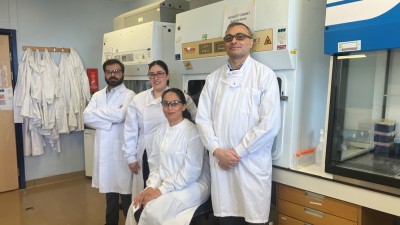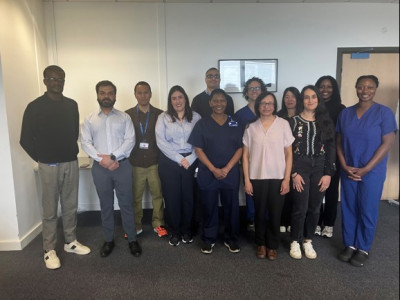When it comes to research, the Royal Free London (RFL) 
But behind all these achievements in clinical research is a crucial service which keeps many of the trust’s studies on the road – the research and development sample service or RADSS.
The service – which has a team of 15 staff – collects patient samples, including tumours, skin, liver biopsies and blood samples, that are a vital part of the research process.
The service also provides some analysis of the samples before they are sent to researchers here at the RFL, as well as across the UK and worldwide, where they contribute to vital discoveries about disease and new treatments.
The RFL has one of the largest sample services in the NHS, with the RADSS team collecting thousands of samples each year for clinicians, academics and commercial organisations as far away as New York or Japan.
RADSS is made up of three separate elements – the RFL research tissue bank, where samples are stored; the tissue access for patient benefit (TAPB) service, where researchers request particular samples they need for their studies; and the good clinical laboratory practice (GCLP) lab, where samples can be analysed.
A new space and an ambitious plan
This summer, the tissue bank and TAPB service will move to a new GCLP lab space next to the clinical research facility on the second floor of the RFH, where new equipment will be installed allowing them to expand their service and carry out more advanced analysis of samples.
Amir Gander, the RADSS head of service, said: “We have an ambitious plan for the service. We want to expand and improve the type of sample analysis we can carry out in our GCLP lab.
“Our RADSS service spans the entire research pipeline – from identifying the nature of disease, to clinical trials and diagnostic validation – and because we link researchers with clinical services, data and academic expertise, we aim to be the go-to place for biomedical research globally.
“And this is all underpinned by the fact that the Royal Free London has a really diverse patient population.”
Meet the RADSS team
Satyarth Rathore is the clinical research data manager for the service.
When a clinician or researcher approaches the RADSS team to ask for a sample, it’s Satyarth’s job to obtain patient clinical data and make sure it is anonymised.
“For their studies, researchers might be looking for a patient with a particular type of tumour and they may need to be a certain age or disease stage so we will look through the patient database to find someone who matches,” he said.
“Once I have found a patient I consider suitable, I will contact their clinician to see if it’s appropriate to ask them to donate a sample. If the clinician agrees, I will ask one of the clinical research practitioners at TAPB to approach the patient for consent to participate in research – usually they do this when the patient is attending a clinic.”
It’s Jason Robley’s job as a clinical research practitioner to approach patients to ask if they would consider donating tissue or blood samples for specific research projects. Often this might be a part of a tumour that is due to be removed in surgery and would otherwise be destroyed.
Jason always lets patients know they are not obliged to donate any samples but he says they often do because they are keen contribute to the discovery of new treatments – even if they won’t benefit personally.
He said: “Patients are provided with information about research at RFL in several ways, so they know we are a big teaching and research trust and patients want to be a part of that too. Some have been with their clinical team for a long time and they want to give back and help them with their work.
If patients agree to donate, Jason will collect the sample, which may involve taking a blood sample or going into the operating theatre to collect a part of a tumour that has been removed by a surgeon. Often, it’s only a tiny part of the tumour that’s needed – 0.5 or 1g.
Jason loves his job and would recommend it to people who have an interest in research. “I love interacting with patients and knowing that I am part of the process that will mean improved treatments for all sorts of conditions,” he added.
Carolina Ramos-Rivera is the operations manager for the TAPB service, which means she engages with researchers to help design studies so innovative ideas can be translated towards clinical treatments and care much faster. She manages the finances, the contracts and delivery of studies with other organisations who require the sample service the RFL provides.
Carolina said: “When we are approached by a researcher for samples, we discuss if it’s feasible and what the costings are.
“I love how we are supporting patient care. For example, we have been collaborating with the liver team on developing a way of providing dialysis for patients with liver disease.”
Rukan Arsu, the clinical research laboratory coordinator, ensures the lab runs smoothly so samples are stored and tested in the right way.
In the lab the samples are stored in either -80ºC freezers or liquid nitrogen and maintaining the equipment is a vital part of the service.
Rukan carries out centrifuge and fridge maintenance and ensures the fridges are defrosted regularly.
She said: “I love the job; I love being involved in research and knowing that all the tasks I carry out are so important – everything has to be rigorous because our researchers and clinicians need precise results and we are often dealing with vulnerable patients.”
Going further
Hanish Anand is the GCLP laboratory and biobank facility manager.
He said a recent grant from the National Institute of Health and Care Research has allowed the team to buy £1 million-worth of cutting-edge equipment for the GCLP.
“Currently we have a lab in the RFL Biobank where we have limited capabilities. When we move to our new lab and install the new machinery, we will be able to do more advanced analysis and develop it to have GCLP certification.
“Once the new lab opens, we will be able to isolate and extract DNA and RNA from cells, perform tissue analysis, and carry out tests to establish what type of immune cells someone has in their blood.
“Currently, our clinicians have to go outside of the trust for this kind of analysis but once the lab opens, external organisations will come to us.”
 Translate
Translate